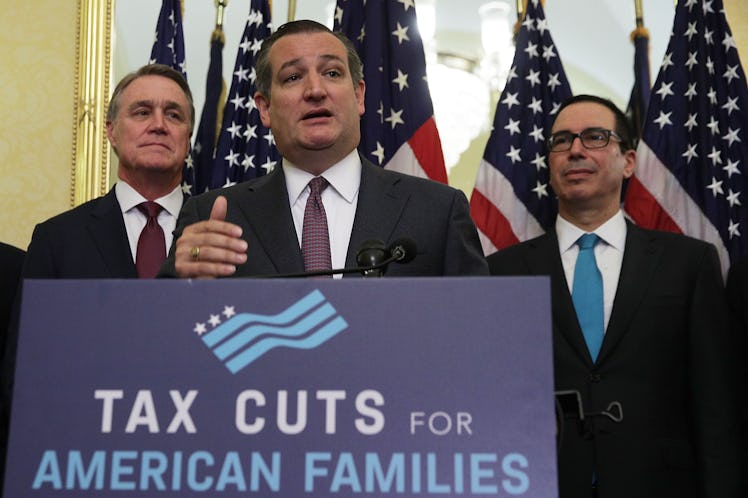
Here’s Why The GOP’s Tax Reform Is So Important (Hint: It Could Affect Your Returns)
There may be no two words more important in politics right now than tax reform, and those words only get more important by the day. That's because President Donald Trump and Republicans in the Senate are aiming to pass a significant tax reform bill by a Friday, Dec. 8 deadline. Because of the bill's complexity, though — and taxes being complex, period — it might be difficult to grasp what tax reform means.
The most basic explanation for tax reform is an effort by Congress to make new laws that would change how everyone in America is taxed. This means laws that would change rates and alter deductions; in other words, reform who gets charged what, when, and why.
The GOP's current effort, which is being passed through Congress without any support from Democrats, seeks to pass tax reform with policies that have been projected to result in an increase of taxes for the middle class and lowering of taxes for the wealthy over time.
Take the Tax Cut and Jobs Act, for example, which is the bill unveiled by Speaker of the House Paul Ryan (R-WI) and other Republican leaders in the House of Representatives. The Tax Cut and Jobs Act cuts the corporate tax rate (the portion of taxable income that business are expected to pay the government in taxes) from 35 percent down to 20 percent.
That change in a specific rate is an example of what tax reform can do.
Achieving tax reform first requires the House to pass a tax bill, which it did earlier this month with the vote of 227 Republicans. Before the bill can make it to the president's desk to be signed and sealed into law, however, the Senate has to pass the same bill or its own version of tax reform before going to "conference" with the House and compromising on a joint bill that would only then require Trump's signature.
The Senate is currently at that second step now, with Republican leaders looking to secure the 50 votes necessary to pass tax reform. Even if the Senate's version of a tax bill differs from the House version, there are some similarities that the former is sure to share with the latter. That means you can get a glimpse of what tax reform could mean for you by comparing how the House and Senate tax bills overlap.
How Your Returns Might Be Affected
In addition to the massive tax cut for corporations — which is what has defined both bills and made them unpopular — there are other significant areas in which House and Senate Republicans agree.
One of those areas is the subject of standardized deductions. The standard deduction is a portion of everyone's personal income that is exempt from being taxed. Without any reform to the nation's tax law, a single person would receive a deduction of about $6,000, according to investment website Motley Fool. If Republicans pass tax reform however, that deduction is likely to double to at least $12,000, as both the House and Senate bills include an increase to that amount.
Another similarity? Both the House and Senate bills aim to increase the child tax credit — a particular area of interest for Ivanka Trump — albeit by different amounts. The current child tax credit allows parents to deduct $1,000 from the amount of taxes they owe, per each dependent child under 17 years of age. The House tax bill aims to increase that credit to $1,600, while the Senate version aims to increase it to $2,000.
Other effects on your tax returns depend on how Republicans in the House and Senate compromise when they eventually have to conference and iron out the differences of their respective bills.
Take one example that could be huge for young people.
The House tax bill gets rid of the student loan interest deduction. That deduction allows a borrower to deduct the amount he or she paid to a student loan lender (like Sallie Mae) from their taxable income. The Senate bill keeps the student loan deduction. So, whether the deduction stays or not will likely be figured out in conference.
Either way, the way you file your taxes will forever be changed if Republicans achieve tax reform.